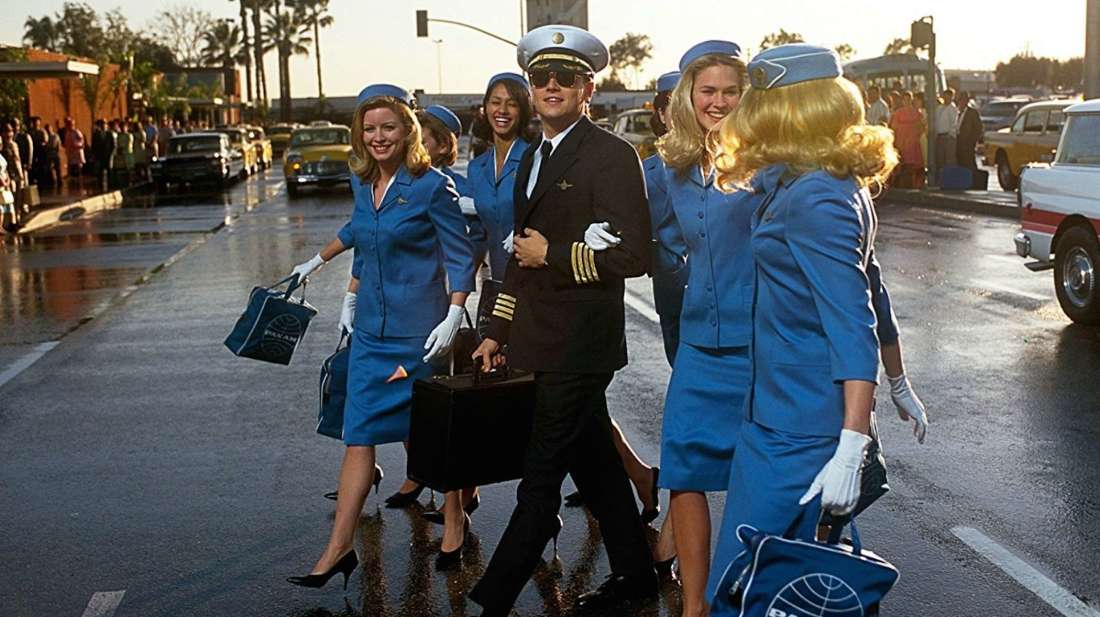
Film Editor Alex Green fondly looks back on a hidden gem, Catch Me If You Can, starring the dynamic duo – Leonardo DiCaprio and Tom Hanks
It’s fitting that the palindromic 2002 is full of sequels. Harry Potter and the Chamber of Secrets, Lord of the Rings: The Two Towers, Men in Black II, and more hurtled onto cinema screens, setting up studios to produce endless sequels for years and years. Whether a bad year or not, one of the best films of this year wasn’t a franchise film and is a massively overlooked film.
Steven Spielberg is a man with an immense filmography, a mastermind behind cinematic classics like Jaws, Schindler’s List and E.T. and in the early 2000’s, decided to produce Catch Me If You Can, with some difficulty. Gathering together a dynamic duo of star Leonardo DiCaprio and James Galdofini, Tony Soprano himself, he struggled to find a director. David Fincher amongst others were asked to direct before Spielberg took over directing duties, and after production was pushed back, Galdofini had to drop out to film his legacy-defining role in The Sopranos. In his place stepped the man who Spielberg has made a myriad of pictures with since, Mr Tom Hanks. In the end, what we have is a film telling the story of Frank Abagnale Jr. (DiCaprio), an 18-year-old kid who forges millions of dollars, lying his way through various jobs, whilst pursued by the persistent FBI agent Carl Hanratty (Hanks).
“In a career of excellent performances, it’s one of DiCaprio's most overlooked.
This pairing, as if you hadn’t had guessed, creates utter acting magic. There is little time these two are on screen together, but when they are, their dialogue and interactions are funny, engaging and so natural. The chemistry is electric between both performers, without sacrificing individual quality. DiCaprio shows the level of talent we’ve had the privilege of seeing over 20 years by beautifully contrasting Abagnale Jr’s craftiness and charisma with his inner turmoil and loneliness. He transitions from a hurt kid, to deceiver, to criminal, to manipulator and finally, to a broken man so effectively. He does so by owning every line of dialogue he has, revealing Abagnale Jr’s compulsion and satisfaction in the art of deception. In a career of excellent performances, it’s one of DiCaprio most overlooked.
The same can be said for Hanks, playing the perfect foil in Hanratty as he brings the obsessive qualities of the character to the fore whilst providing some great hidden pain and mirroring DiCaprio’s glee with some hilarious outbursts of frustration. His dry wit and ultra-serious demeanour meshes brilliantly and their dynamic also helps to propel the plot along, as the film transforms into a deeply personal game of cat and mouse in the third act. They aren’t the only players here. Christopher Walken picked up – deservedly – a best supporting actor nomination at the Oscars for his great performance as Frank Abagnale Sr, playing a father constantly losing everything despite his attempts to keep things together and ultimately, disappointing those around him. There’s even a decent role given to Amy Adams, playing Brenda, an innocent young nurse who Abagnale seemingly falls for, yet is another scammed by Abagnale’s deviousness in quite a shocking way.
These characters feel so well-realised in a script that provides great linearity, depth and even a surprising degree of comedy (you’ll find yourself laughing and rolling your eyes at a James Bond joke). These elements combine to create the engaging thematic nuances on the nature of truth and acceptance. When Abagnale Jr. sees his family broken at the start, he runs and promises to ‘get it all back”’, but his phone calls to Hanratty are so interesting, because as he points out ‘He has no one else to call.’ His devolution matches his never-ending refusal to accept the tragic loss of all he had, and seeing the two gain a mutual understanding through the concept ‘it’s easier living the lie.’ This thematic richness elevates Catch Me If You Can beyond a standard drama. In a time where the credibility of truth is constantly questioned, this film holds up supremely well.
Beyond the characters and plot, Spielberg’s direction is typically strong. His willingness not to lockdown the camera and allow scenes to play out without cutting obsessively is so welcoming. He truly makes the viewer feel like an observer, peering through the cinematic window. Because of this, the pacing of every scene is smooth and constant, as Spielberg and his brilliant crew allow scenes to always feel alive and moving. It needs to be stressed, this is done without any hyperactive editing. The constraint and discipline of the camerawork is so impressive. This excellence corresponds to the brilliant production design and cinematography, creating a beautiful classic look.
If there’s one issue, it may be the film is slightly too long in the finale, even though the film still wraps questioning the characters and who they are., and the occasional on the nose joke is a bit far-fetched. It is also adapted from a true story with a fair bit of artistic license, and some may be bothered by this. If you wish, the man behind the schemes is the author of the book Catch Me If You Can: The True Story of a Real Fake. These are merely small complaints.
With all of this, Catch Me If You Can is a gem in a year of sequels and franchise films. So, when we look back on Spielberg’s massive filmography, don’t look past this. It’s up there with his greatest and is a truly overlooked piece of artistic brilliance.
Verdict:
A narrative that excels, spellbinding performances, great direction and a fantastic script. The ingredients that make Catch Me If You Can a great watch and a classic film.
Rating:
9/10
Comments